Unit 2 单元话题语法选择练习-2022-2023学年八年级英语下册单元重难点易错题精练(牛津深圳版)(含解析)
文档属性
| 名称 | Unit 2 单元话题语法选择练习-2022-2023学年八年级英语下册单元重难点易错题精练(牛津深圳版)(含解析) | 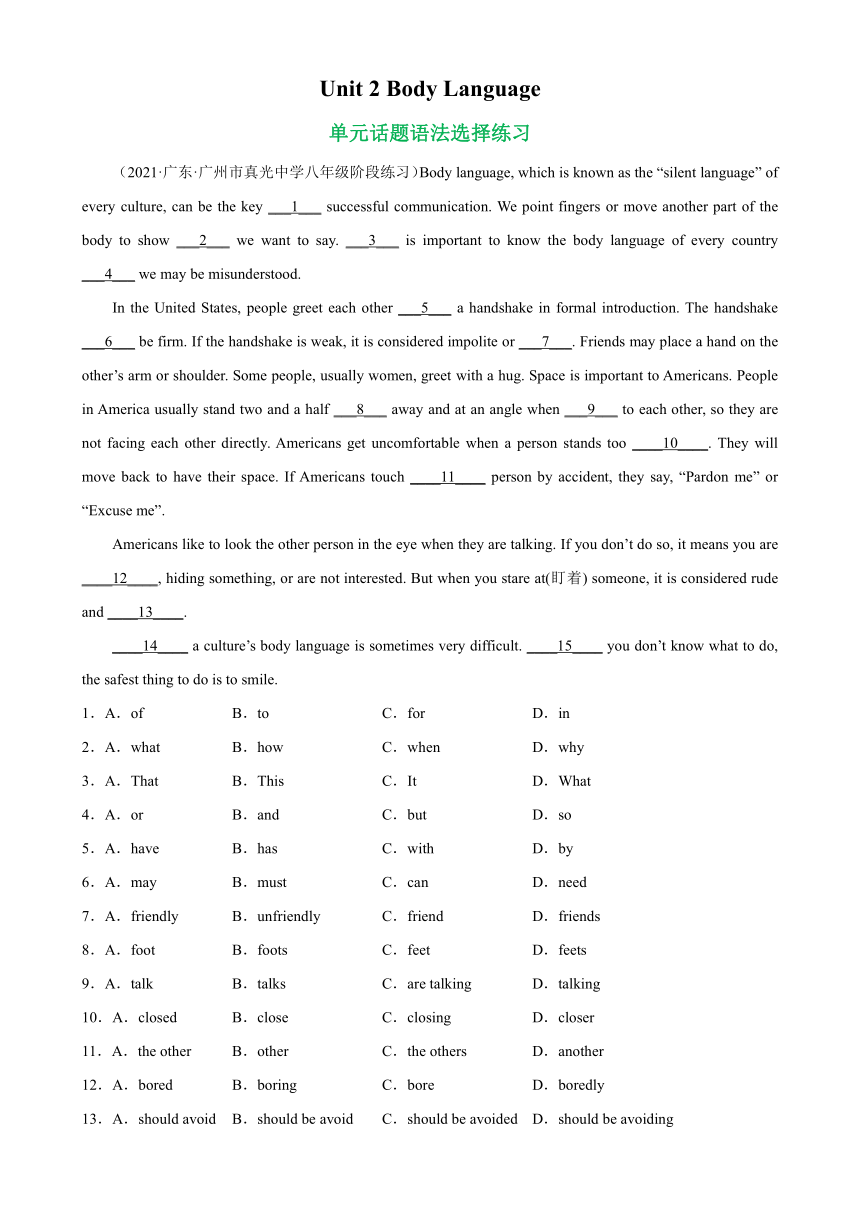 | |
| 格式 | docx | ||
| 文件大小 | 26.1KB | ||
| 资源类型 | 教案 | ||
| 版本资源 | 牛津深圳版 | ||
| 科目 | 英语 | ||
| 更新时间 | 2023-03-28 13:50:27 | ||
图片预览

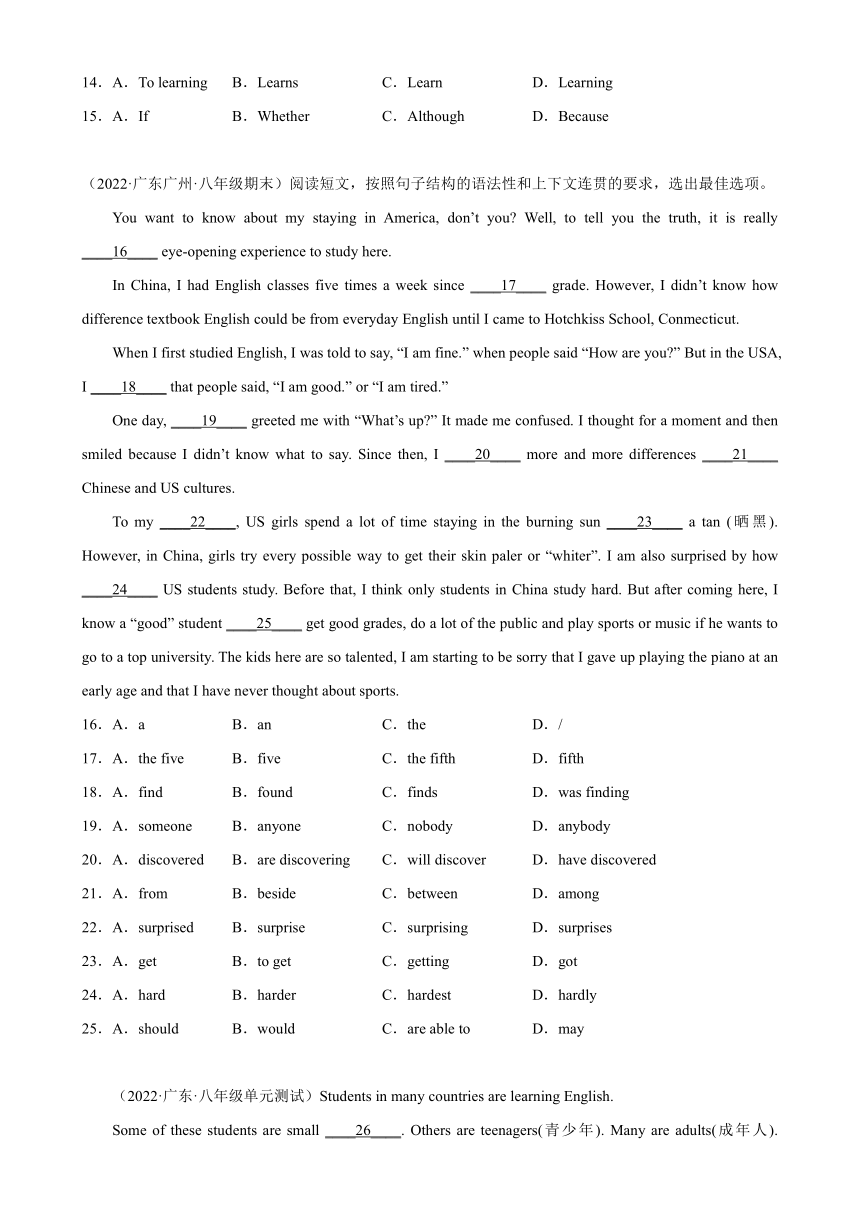
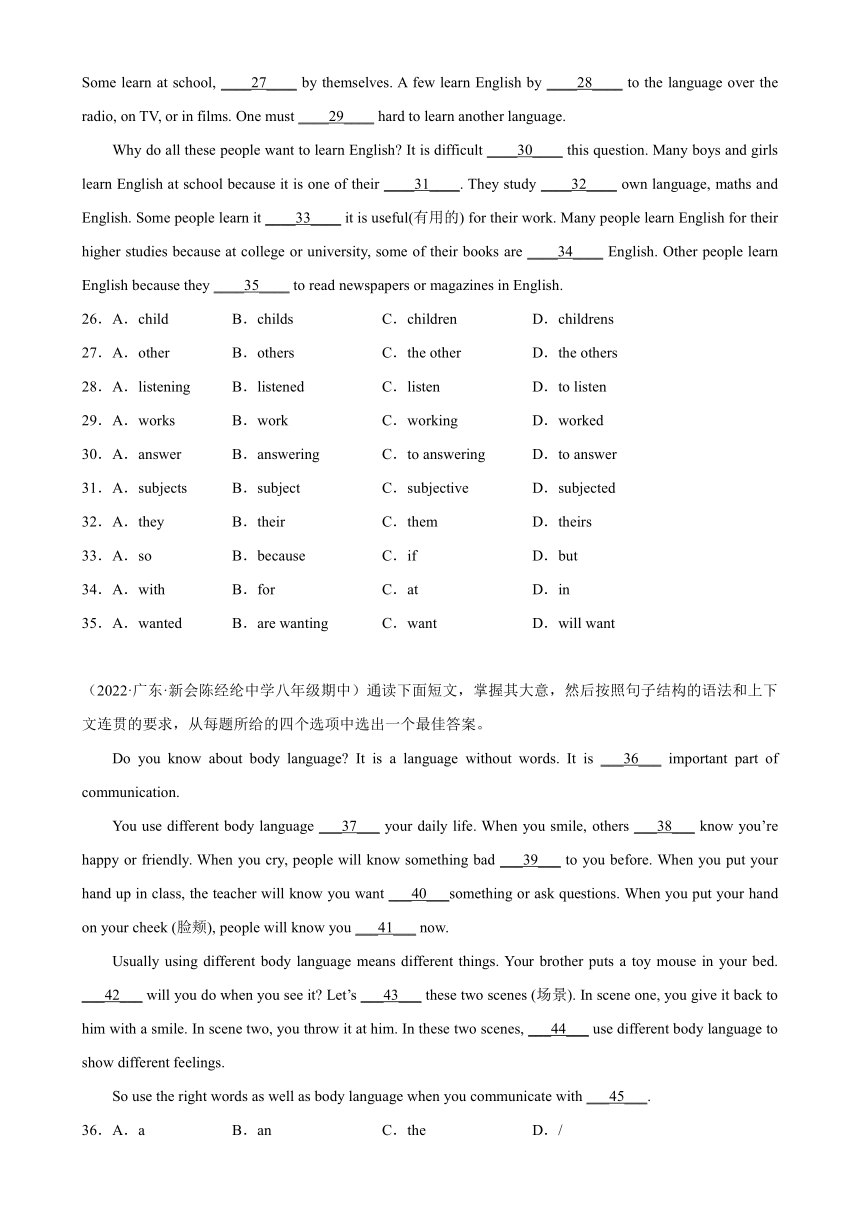
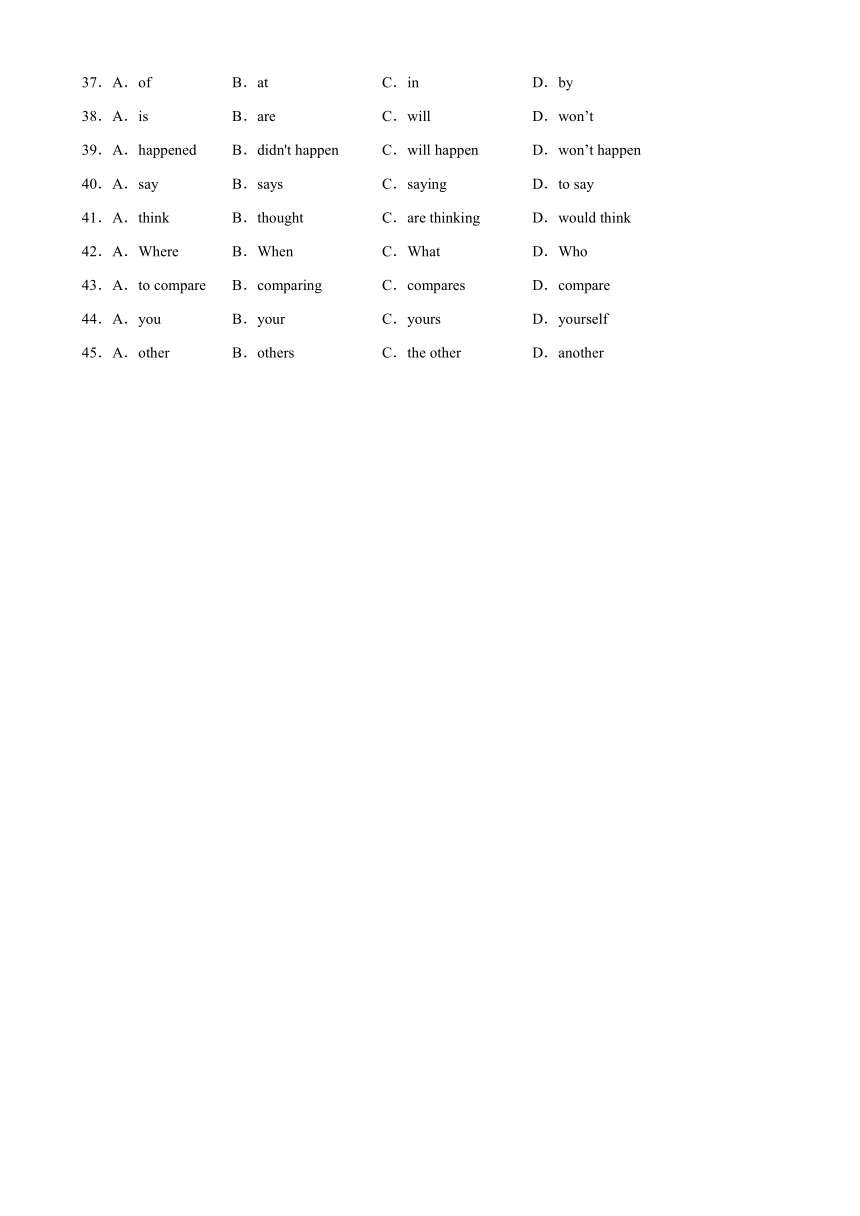
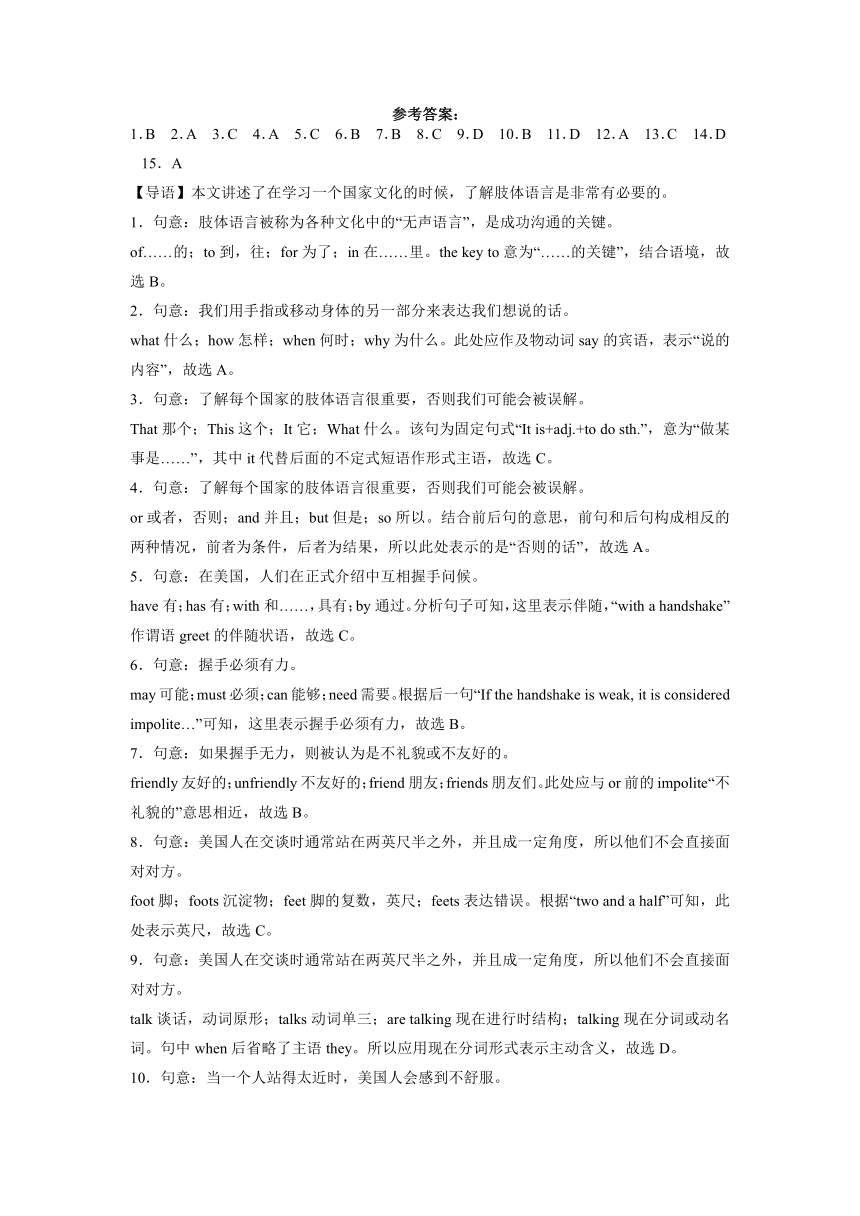
文档简介
Unit 2 Body Language
单元话题语法选择练习
(2021·广东·广州市真光中学八年级阶段练习)Body language, which is known as the “silent language” of every culture, can be the key ___1___ successful communication. We point fingers or move another part of the body to show ___2___ we want to say. ___3___ is important to know the body language of every country ___4___ we may be misunderstood.
In the United States, people greet each other ___5___ a handshake in formal introduction. The handshake ___6___ be firm. If the handshake is weak, it is considered impolite or ___7___. Friends may place a hand on the other’s arm or shoulder. Some people, usually women, greet with a hug. Space is important to Americans. People in America usually stand two and a half ___8___ away and at an angle when ___9___ to each other, so they are not facing each other directly. Americans get uncomfortable when a person stands too ____10____. They will move back to have their space. If Americans touch ____11____ person by accident, they say, “Pardon me” or “Excuse me”.
Americans like to look the other person in the eye when they are talking. If you don’t do so, it means you are ____12____, hiding something, or are not interested. But when you stare at(盯着) someone, it is considered rude and ____13____.
____14____ a culture’s body language is sometimes very difficult. ____15____ you don’t know what to do, the safest thing to do is to smile.
1.A.of B.to C.for D.in
2.A.what B.how C.when D.why
3.A.That B.This C.It D.What
4.A.or B.and C.but D.so
5.A.have B.has C.with D.by
6.A.may B.must C.can D.need
7.A.friendly B.unfriendly C.friend D.friends
8.A.foot B.foots C.feet D.feets
9.A.talk B.talks C.are talking D.talking
10.A.closed B.close C.closing D.closer
11.A.the other B.other C.the others D.another
12.A.bored B.boring C.bore D.boredly
13.A.should avoid B.should be avoid C.should be avoided D.should be avoiding
14.A.To learning B.Learns C.Learn D.Learning
15.A.If B.Whether C.Although D.Because
(2022·广东广州·八年级期末)阅读短文,按照句子结构的语法性和上下文连贯的要求,选出最佳选项。
You want to know about my staying in America, don’t you Well, to tell you the truth, it is really ____16____ eye-opening experience to study here.
In China, I had English classes five times a week since ____17____ grade. However, I didn’t know how difference textbook English could be from everyday English until I came to Hotchkiss School, Conmecticut.
When I first studied English, I was told to say, “I am fine.” when people said “How are you ” But in the USA, I ____18____ that people said, “I am good.” or “I am tired.”
One day, ____19____ greeted me with “What’s up ” It made me confused. I thought for a moment and then smiled because I didn’t know what to say. Since then, I ____20____ more and more differences ____21____ Chinese and US cultures.
To my ____22____, US girls spend a lot of time staying in the burning sun ____23____ a tan (晒黑). However, in China, girls try every possible way to get their skin paler or “whiter”. I am also surprised by how ____24____ US students study. Before that, I think only students in China study hard. But after coming here, I know a “good” student ____25____ get good grades, do a lot of the public and play sports or music if he wants to go to a top university. The kids here are so talented, I am starting to be sorry that I gave up playing the piano at an early age and that I have never thought about sports.
16.A.a B.an C.the D./
17.A.the five B.five C.the fifth D.fifth
18.A.find B.found C.finds D.was finding
19.A.someone B.anyone C.nobody D.anybody
20.A.discovered B.are discovering C.will discover D.have discovered
21.A.from B.beside C.between D.among
22.A.surprised B.surprise C.surprising D.surprises
23.A.get B.to get C.getting D.got
24.A.hard B.harder C.hardest D.hardly
25.A.should B.would C.are able to D.may
(2022·广东·八年级单元测试)Students in many countries are learning English.
Some of these students are small ____26____. Others are teenagers(青少年). Many are adults(成年人). Some learn at school, ____27____ by themselves. A few learn English by ____28____ to the language over the radio, on TV, or in films. One must ____29____ hard to learn another language.
Why do all these people want to learn English It is difficult ____30____ this question. Many boys and girls learn English at school because it is one of their ____31____. They study ____32____ own language, maths and English. Some people learn it ____33____ it is useful(有用的) for their work. Many people learn English for their higher studies because at college or university, some of their books are ____34____ English. Other people learn English because they ____35____ to read newspapers or magazines in English.
26.A.child B.childs C.children D.childrens
27.A.other B.others C.the other D.the others
28.A.listening B.listened C.listen D.to listen
29.A.works B.work C.working D.worked
30.A.answer B.answering C.to answering D.to answer
31.A.subjects B.subject C.subjective D.subjected
32.A.they B.their C.them D.theirs
33.A.so B.because C.if D.but
34.A.with B.for C.at D.in
35.A.wanted B.are wanting C.want D.will want
(2022·广东·新会陈经纶中学八年级期中)通读下面短文,掌握其大意,然后按照句子结构的语法和上下文连贯的要求,从每题所给的四个选项中选出一个最佳答案。
Do you know about body language It is a language without words. It is ___36___ important part of communication.
You use different body language ___37___ your daily life. When you smile, others ___38___ know you’re happy or friendly. When you cry, people will know something bad ___39___ to you before. When you put your hand up in class, the teacher will know you want ___40___something or ask questions. When you put your hand on your cheek (脸颊), people will know you ___41___ now.
Usually using different body language means different things. Your brother puts a toy mouse in your bed. ___42___ will you do when you see it Let’s ___43___ these two scenes (场景). In scene one, you give it back to him with a smile. In scene two, you throw it at him. In these two scenes, ___44___ use different body language to show different feelings.
So use the right words as well as body language when you communicate with ___45___.
36.A.a B.an C.the D./
37.A.of B.at C.in D.by
38.A.is B.are C.will D.won’t
39.A.happened B.didn't happen C.will happen D.won’t happen
40.A.say B.says C.saying D.to say
41.A.think B.thought C.are thinking D.would think
42.A.Where B.When C.What D.Who
43.A.to compare B.comparing C.compares D.compare
44.A.you B.your C.yours D.yourself
45.A.other B.others C.the other D.another
参考答案:
1.B 2.A 3.C 4.A 5.C 6.B 7.B 8.C 9.D 10.B 11.D 12.A 13.C 14.D 15.A
【导语】本文讲述了在学习一个国家文化的时候,了解肢体语言是非常有必要的。
1.句意:肢体语言被称为各种文化中的“无声语言”,是成功沟通的关键。
of……的;to到,往;for为了;in在……里。the key to意为“……的关键”,结合语境,故选B。
2.句意:我们用手指或移动身体的另一部分来表达我们想说的话。
what什么;how怎样;when何时;why为什么。此处应作及物动词say的宾语,表示“说的内容”,故选A。
3.句意:了解每个国家的肢体语言很重要,否则我们可能会被误解。
That那个;This这个;It它;What什么。该句为固定句式“It is+adj.+to do sth.”,意为“做某事是……”,其中it代替后面的不定式短语作形式主语,故选C。
4.句意:了解每个国家的肢体语言很重要,否则我们可能会被误解。
or或者,否则;and并且;but但是;so所以。结合前后句的意思,前句和后句构成相反的两种情况,前者为条件,后者为结果,所以此处表示的是“否则的话”,故选A。
5.句意:在美国,人们在正式介绍中互相握手问候。
have有;has有;with和……,具有;by通过。分析句子可知,这里表示伴随,“with a handshake”作谓语greet的伴随状语,故选C。
6.句意:握手必须有力。
may可能;must必须;can能够;need需要。根据后一句“If the handshake is weak, it is considered impolite…”可知,这里表示握手必须有力,故选B。
7.句意:如果握手无力,则被认为是不礼貌或不友好的。
friendly友好的;unfriendly不友好的;friend朋友;friends朋友们。此处应与or前的impolite“不礼貌的”意思相近,故选B。
8.句意:美国人在交谈时通常站在两英尺半之外,并且成一定角度,所以他们不会直接面对对方。
foot脚;foots沉淀物;feet脚的复数,英尺;feets表达错误。根据“two and a half”可知,此处表示英尺,故选C。
9.句意:美国人在交谈时通常站在两英尺半之外,并且成一定角度,所以他们不会直接面对对方。
talk谈话,动词原形;talks动词单三;are talking现在进行时结构;talking现在分词或动名词。句中when后省略了主语they。所以应用现在分词形式表示主动含义,故选D。
10.句意:当一个人站得太近时,美国人会感到不舒服。
closed关门的;close关闭,接近的(地);closing关闭;closer更接近。根据前一句“ stand two and a half feet away and at an angle”可知,美国人说话不喜欢站得太近,too后用副词原级形式,故选B。
11.句意:如果美国人不小心碰了别人,他们会说:“对不起”或“打扰了”。
the other(两者中的)另一个;other其他的,后接可数名词复数或不可数名词;the others其他的东西;another(三者或三者以上)另一个,其后接可数名词单数。根据空后的person为可数名词单数可知,another符合语境,故选D。
12.句意:如果你不这么做,那就意味着你很无聊,在隐藏着什么,或者不感兴趣。
bored感到无聊的,形容词;boring无聊的,形容词;bore使……无聊;boredly感到无聊地,副词。空格处是形容主语you,指人,作are的表语,为形容词,故选A。
13.句意:但是当你盯着某人看的时候,这被认为是粗鲁的,应该避免做出这种行为。
should avoid应该避免,主动形式;should be avoid表达错误;should be avoided应该被避免,被动形式;should be avoiding表达错误。该句的主语是it,指代的是“you stare at someone”,与动词avoid之间是动宾关系,所以应用被动形式,故选C。
14.句意:学习一种文化的肢体语言有时非常困难。
To learning表达错误;Learns学习,动词单三形式;Learn动词原形;Learning动名词。learn意为“学习”,是动词,在句中作主语,应用动名词形式,故选D。
15.句意:如果你不知道该做什么,最安全的方法就是微笑。
If如果;Whether是否;Although虽然,尽管;Because因为。分析句意,前句表示条件,所以用if引导条件状语从句,故选A。
16.B 17.C 18.B 19.A 20.D 21.C 22.B 23.B 24.A 25.A
【导语】本文主要讲述了作者通过在美国学习的经历介绍了中美文化之间的差异。
16.句意:好吧,实话告诉你,在这里学习真的是让人大开眼界的一次经历。
a一(用于以辅音音素开头的单词前,表泛指);an一(用于以元音音素开头的单词前,表泛指);the这(表特指);/不填。根据“it is really...eye-opening experience to study here”可知,此处泛指一次大开眼界的经历,且eye-opening是以元音音素开头的单词,所以此空是an。故选B。
17.句意:在中国,从五年级开始,我每周上五次英语课。
the five这五个(基数词);five五(基数词);the fifth第五(序数词);fifth第五(序数词,在本句中该序数词前缺少the)。根据“In China, I had English classes five times a week since...grade.”可知,表示“五年级”,用the fifth grade,序数词前加定冠词the。故选C。
18.句意:但是在美国,我发现人们会说“我很好”或“我很累”。
find发现(动词原形);found发现(过去式);finds发现(第三人称单数形式);was finding发现(过去进行时结构)。根据“But in the USA, I...that people said, ‘I am good.’ or ‘I am tired.’ ”,以及结合上下文可知,在美国学习的经历已成为了过去,所以该句用一般过去时,谓语动词用过去式。故选B。
19.句意:有一天,有人跟我打招呼说“怎么了?”,这让我很困惑。
someone有人(用于肯定句);anyone任何一个;nobody没有人;anybody任何人(用于否定句或疑问句)。根据“One day...greeted me with ‘What’s up ’ It made me confused.”可知,此句是肯定句,且表示有一天,有人来跟“我”打招呼。故选A。
20.句意:自从那时开始,我已经发现了越来越多中美文化之间的差异。
discovered发现(过去式);are discovering正在发现(现在进行时结构);will discover将会发现(一般将来时结构);have discovered已经发现(现在完成时结构)。根据“Since then, I...more and more differences...”可知,since then“从那时起”,表明句子要用现在完成时,谓语结构是have/has done,句子主语是I,所以用have discovered。故选D。
21.句意:自从那时开始,我已经发现了越来越多中国文化和美国文化之间的差异。
from从;beside在……旁边;between在……之间(用于两者);among在……之间(用于三者及以上)。根据“...more and more differences...Chinese and US cultures”可知,between...and...,表示“在……与……之间”,用于两者,且中国文化和美国文化,属于两者。故选C。
22.句意:让我惊讶的是,为了晒黑,美国女孩会花大量时间在晒太阳这件事上。
surprised惊喜的(形容人);surprise惊喜(名词);surprising令人惊讶的(形容物);surprises使惊奇(第三人称单数形式)。根据“To my...”可知,to one’s surprise,表示“让某人惊讶的是”,此空应是名词。故选B。
23.句意:让我惊讶的是,为了晒黑,美国女孩会花大量时间在晒太阳这件事上。
get得到(动词原形);to get为了得到(动词不定式);getting得到(动词现在分词);got得到(过去式)。根据“US girls spend a lot of time staying in the burning sun...a tan (晒黑)”可知,美国女孩们为了晒黑而花大量时间晒太阳,此处是用动词不定式作目的状语。故选B。
24.句意:我也对美国学生学习如此努力感到惊讶。
hard努力地(副词原级);harder更努力地(副词比较级);hardest最努力地(副词最高级);hardly几乎不。根据“how...US students study”可知,此空处所在的句子是感叹句,为how+形容词/副词+主+谓,且study hard“努力学习”其中的hard则为副词。故选A。
25.句意:但来到这里之后,我知道一个“好”学生如果想上好的大学,就应该取得好成绩,参加很多公共活动,做运动或玩音乐。
should应该;would将;are able to能够;may可以。根据“But after coming here, I know a ‘good’ student...get good grades, do a lot of the public and plays sports or music if he wants to go to a top university.”可知,一个“好”学生想要进入好大学,就应该要取得好成绩,此外还得做其他事情,选项A“应该”符合语境。故选A。
26.C 27.B 28.A 29.B 30.D 31.A 32.B 33.B 34.D 35.C
【导语】本文介绍了人们学习英语的情况以及原因等。
26.句意:这些学生中有些是小孩子。
child孩子,单数名词;childs错误形式;children孩子,复数形式;childrens错误形式;根据“Others are teenagers(青少年)”可知,一些学生是孩子们,故选C。
27.句意:有些人在学校学习,有些人自己学习。
other其他的,后接复数名词;others其他的,泛指剩余的部分;the other特指两者中的另一个;the others其他的,指剩余的所有;根据“Some learn at school”可知,此处是泛指剩余的部分,是some...others...的结构,故选B。
28.句意:一些人通过广播、电视或电影来学习英语。
listening听,现在分词或动名词形式;listened听,过去式;listen to听,动词原形;listen听,动词原形;by是介词,后接doing形式,空后有to,此处直接用listening,故选A。
29.句意:一个人必须努力学习另一种语言。
works工作,动词三单;work工作,动词原形;working工作,现在分词;worked工作,过去式;must是情态动词,后接动词原形,故选B。
30.句意:很难回答这个问题。
answer回答,动词原形;answering回答,现在分词或动名词;to answering回答,介词+动名词形式;to answer回答,不定式;此处是It is adj to do sth的句型,故选D。
31.句意:许多男孩和女孩在学校学习英语,因为英语是他们的科目之一。
subjects科目,复数形式;subject科目,单数名词;subjective主观的;subjected使从属;根据“Many boys and girls learn English at school because it is one of their”可知,英语是他们的科目之一,one of后接复数名词,故选A。
32.句意:他们学习自己的语言、数学和英语。
they他们,主格;their他们的,形容词性物主代词;them他们,宾格;theirs他们的,名词性物主代词;空处修饰其后的名词,应用形容词性物主代词,故选B。
33.句意:有些人学习它是因为它对他们的工作有用。
so因此;because因为;if如果;but但是;空格前后是因果关系,属于“前果后因”的结构,应用because引导原因状语从句,故选B。
34.句意:许多人学习英语是为了他们的高等教育,因为在大学里,他们的一些书是用英语写的。
with和……一起;for为了;at在;in在……里面;根据“their higher studies because at college or university, some of their books”可知,书是用英语写的,故选D。
35.句意:其他人学习英语是因为他们想阅读英语报纸或杂志。
wanted想要,过去式;are wanting想要,现在进行时结构;want想要,动词原形;will want想要,一般将来时;根据“Other people learn English”可知,此处动词也用一般现在时,主语是复数人称,动词用原形,故选C。
36.B 37.C 38.C 39.A 40.D 41.C 42.C 43.D 44.A 45.B
【导语】本文是一篇说明文,向我们介绍肢体语言的重要性。
36.句意:它是沟通的重要组成部分。
a泛指一个,用于辅音音素开头的词前;an泛指一个,用于元音音素开头的单词前;the定冠词表特指;/零冠词。此处泛指一个方法,“important”首字母发元音音素,故选B。
37.句意:你在日常生活中使用不同的肢体语言。
of……的;at在;in在……中;by通过。in one’s daily life“在日常生活中”,故选C。
38.句意:当你微笑时,别人会知道你快乐或友好。
is主语是第三人称单数;are主语是第二人称或复数;will一般将来时的助动词;won’t一般将来时否定句的助动词。根据后句“When you cry, people will know...”可知,此处也用一般将来时,故选C。
39.句意:当你哭的时候,人们就会知道你曾经有过不好的经历。
happened一般过去时的肯定句;didn’t happen一般过去时的否定句;will happen一般将来时的肯定句;won’t happen一般将来时的否定句。根据“When you cry, people will know something bad...to you before.”可知,有不好的事情发生,时态是一般过去时,故选A。
40.句意:当你在课堂上举手时,老师就会知道你想说什么或问问题。
say动词原形;says动词三单;saying动名词/现在分词;to say动词不定式。want to do sth“想要做某事”,故选D。
41.句意:当你把手放在脸颊上时,人们就会知道你在思考。
think一般现在时;thought一般过去时;are thinking现在进行时;would think过去将来时。根据“now”可知,时态是现在进行时,表示“正在思考”,故选C。
42.句意:当你看到它的时候你会做什么?
Where哪里;When何时;What什么;Who谁。根据“...will you do when you see it ”可知,是做什么,用what作宾语,故选C。
43.让我们比较一下这两个场景。句意:
to compare动词不定式;comparing动名词/现在分词;compares动词三单;compare动词原形。let’s do sth“让我们做某事”,故选D。
44.句意:在这两个场景中,你用不同的肢体语言来表达不同的感受。
you你;your你的;yours你的;yourself你自己。根据“...use different body language to show different feelings.”可知,此处在句中作主语,用人称代词主格,故选A。
45.句意:所以,当你与他人交流时,使用正确的语言和肢体语言。
other其他的;others其他人;the other两者中的另一个;another三者及以上的另一个。根据“So use the right words as well as body language when you communicate with...”可知,此处作宾语,表示“与他人交流”,故选B。
单元话题语法选择练习
(2021·广东·广州市真光中学八年级阶段练习)Body language, which is known as the “silent language” of every culture, can be the key ___1___ successful communication. We point fingers or move another part of the body to show ___2___ we want to say. ___3___ is important to know the body language of every country ___4___ we may be misunderstood.
In the United States, people greet each other ___5___ a handshake in formal introduction. The handshake ___6___ be firm. If the handshake is weak, it is considered impolite or ___7___. Friends may place a hand on the other’s arm or shoulder. Some people, usually women, greet with a hug. Space is important to Americans. People in America usually stand two and a half ___8___ away and at an angle when ___9___ to each other, so they are not facing each other directly. Americans get uncomfortable when a person stands too ____10____. They will move back to have their space. If Americans touch ____11____ person by accident, they say, “Pardon me” or “Excuse me”.
Americans like to look the other person in the eye when they are talking. If you don’t do so, it means you are ____12____, hiding something, or are not interested. But when you stare at(盯着) someone, it is considered rude and ____13____.
____14____ a culture’s body language is sometimes very difficult. ____15____ you don’t know what to do, the safest thing to do is to smile.
1.A.of B.to C.for D.in
2.A.what B.how C.when D.why
3.A.That B.This C.It D.What
4.A.or B.and C.but D.so
5.A.have B.has C.with D.by
6.A.may B.must C.can D.need
7.A.friendly B.unfriendly C.friend D.friends
8.A.foot B.foots C.feet D.feets
9.A.talk B.talks C.are talking D.talking
10.A.closed B.close C.closing D.closer
11.A.the other B.other C.the others D.another
12.A.bored B.boring C.bore D.boredly
13.A.should avoid B.should be avoid C.should be avoided D.should be avoiding
14.A.To learning B.Learns C.Learn D.Learning
15.A.If B.Whether C.Although D.Because
(2022·广东广州·八年级期末)阅读短文,按照句子结构的语法性和上下文连贯的要求,选出最佳选项。
You want to know about my staying in America, don’t you Well, to tell you the truth, it is really ____16____ eye-opening experience to study here.
In China, I had English classes five times a week since ____17____ grade. However, I didn’t know how difference textbook English could be from everyday English until I came to Hotchkiss School, Conmecticut.
When I first studied English, I was told to say, “I am fine.” when people said “How are you ” But in the USA, I ____18____ that people said, “I am good.” or “I am tired.”
One day, ____19____ greeted me with “What’s up ” It made me confused. I thought for a moment and then smiled because I didn’t know what to say. Since then, I ____20____ more and more differences ____21____ Chinese and US cultures.
To my ____22____, US girls spend a lot of time staying in the burning sun ____23____ a tan (晒黑). However, in China, girls try every possible way to get their skin paler or “whiter”. I am also surprised by how ____24____ US students study. Before that, I think only students in China study hard. But after coming here, I know a “good” student ____25____ get good grades, do a lot of the public and play sports or music if he wants to go to a top university. The kids here are so talented, I am starting to be sorry that I gave up playing the piano at an early age and that I have never thought about sports.
16.A.a B.an C.the D./
17.A.the five B.five C.the fifth D.fifth
18.A.find B.found C.finds D.was finding
19.A.someone B.anyone C.nobody D.anybody
20.A.discovered B.are discovering C.will discover D.have discovered
21.A.from B.beside C.between D.among
22.A.surprised B.surprise C.surprising D.surprises
23.A.get B.to get C.getting D.got
24.A.hard B.harder C.hardest D.hardly
25.A.should B.would C.are able to D.may
(2022·广东·八年级单元测试)Students in many countries are learning English.
Some of these students are small ____26____. Others are teenagers(青少年). Many are adults(成年人). Some learn at school, ____27____ by themselves. A few learn English by ____28____ to the language over the radio, on TV, or in films. One must ____29____ hard to learn another language.
Why do all these people want to learn English It is difficult ____30____ this question. Many boys and girls learn English at school because it is one of their ____31____. They study ____32____ own language, maths and English. Some people learn it ____33____ it is useful(有用的) for their work. Many people learn English for their higher studies because at college or university, some of their books are ____34____ English. Other people learn English because they ____35____ to read newspapers or magazines in English.
26.A.child B.childs C.children D.childrens
27.A.other B.others C.the other D.the others
28.A.listening B.listened C.listen D.to listen
29.A.works B.work C.working D.worked
30.A.answer B.answering C.to answering D.to answer
31.A.subjects B.subject C.subjective D.subjected
32.A.they B.their C.them D.theirs
33.A.so B.because C.if D.but
34.A.with B.for C.at D.in
35.A.wanted B.are wanting C.want D.will want
(2022·广东·新会陈经纶中学八年级期中)通读下面短文,掌握其大意,然后按照句子结构的语法和上下文连贯的要求,从每题所给的四个选项中选出一个最佳答案。
Do you know about body language It is a language without words. It is ___36___ important part of communication.
You use different body language ___37___ your daily life. When you smile, others ___38___ know you’re happy or friendly. When you cry, people will know something bad ___39___ to you before. When you put your hand up in class, the teacher will know you want ___40___something or ask questions. When you put your hand on your cheek (脸颊), people will know you ___41___ now.
Usually using different body language means different things. Your brother puts a toy mouse in your bed. ___42___ will you do when you see it Let’s ___43___ these two scenes (场景). In scene one, you give it back to him with a smile. In scene two, you throw it at him. In these two scenes, ___44___ use different body language to show different feelings.
So use the right words as well as body language when you communicate with ___45___.
36.A.a B.an C.the D./
37.A.of B.at C.in D.by
38.A.is B.are C.will D.won’t
39.A.happened B.didn't happen C.will happen D.won’t happen
40.A.say B.says C.saying D.to say
41.A.think B.thought C.are thinking D.would think
42.A.Where B.When C.What D.Who
43.A.to compare B.comparing C.compares D.compare
44.A.you B.your C.yours D.yourself
45.A.other B.others C.the other D.another
参考答案:
1.B 2.A 3.C 4.A 5.C 6.B 7.B 8.C 9.D 10.B 11.D 12.A 13.C 14.D 15.A
【导语】本文讲述了在学习一个国家文化的时候,了解肢体语言是非常有必要的。
1.句意:肢体语言被称为各种文化中的“无声语言”,是成功沟通的关键。
of……的;to到,往;for为了;in在……里。the key to意为“……的关键”,结合语境,故选B。
2.句意:我们用手指或移动身体的另一部分来表达我们想说的话。
what什么;how怎样;when何时;why为什么。此处应作及物动词say的宾语,表示“说的内容”,故选A。
3.句意:了解每个国家的肢体语言很重要,否则我们可能会被误解。
That那个;This这个;It它;What什么。该句为固定句式“It is+adj.+to do sth.”,意为“做某事是……”,其中it代替后面的不定式短语作形式主语,故选C。
4.句意:了解每个国家的肢体语言很重要,否则我们可能会被误解。
or或者,否则;and并且;but但是;so所以。结合前后句的意思,前句和后句构成相反的两种情况,前者为条件,后者为结果,所以此处表示的是“否则的话”,故选A。
5.句意:在美国,人们在正式介绍中互相握手问候。
have有;has有;with和……,具有;by通过。分析句子可知,这里表示伴随,“with a handshake”作谓语greet的伴随状语,故选C。
6.句意:握手必须有力。
may可能;must必须;can能够;need需要。根据后一句“If the handshake is weak, it is considered impolite…”可知,这里表示握手必须有力,故选B。
7.句意:如果握手无力,则被认为是不礼貌或不友好的。
friendly友好的;unfriendly不友好的;friend朋友;friends朋友们。此处应与or前的impolite“不礼貌的”意思相近,故选B。
8.句意:美国人在交谈时通常站在两英尺半之外,并且成一定角度,所以他们不会直接面对对方。
foot脚;foots沉淀物;feet脚的复数,英尺;feets表达错误。根据“two and a half”可知,此处表示英尺,故选C。
9.句意:美国人在交谈时通常站在两英尺半之外,并且成一定角度,所以他们不会直接面对对方。
talk谈话,动词原形;talks动词单三;are talking现在进行时结构;talking现在分词或动名词。句中when后省略了主语they。所以应用现在分词形式表示主动含义,故选D。
10.句意:当一个人站得太近时,美国人会感到不舒服。
closed关门的;close关闭,接近的(地);closing关闭;closer更接近。根据前一句“ stand two and a half feet away and at an angle”可知,美国人说话不喜欢站得太近,too后用副词原级形式,故选B。
11.句意:如果美国人不小心碰了别人,他们会说:“对不起”或“打扰了”。
the other(两者中的)另一个;other其他的,后接可数名词复数或不可数名词;the others其他的东西;another(三者或三者以上)另一个,其后接可数名词单数。根据空后的person为可数名词单数可知,another符合语境,故选D。
12.句意:如果你不这么做,那就意味着你很无聊,在隐藏着什么,或者不感兴趣。
bored感到无聊的,形容词;boring无聊的,形容词;bore使……无聊;boredly感到无聊地,副词。空格处是形容主语you,指人,作are的表语,为形容词,故选A。
13.句意:但是当你盯着某人看的时候,这被认为是粗鲁的,应该避免做出这种行为。
should avoid应该避免,主动形式;should be avoid表达错误;should be avoided应该被避免,被动形式;should be avoiding表达错误。该句的主语是it,指代的是“you stare at someone”,与动词avoid之间是动宾关系,所以应用被动形式,故选C。
14.句意:学习一种文化的肢体语言有时非常困难。
To learning表达错误;Learns学习,动词单三形式;Learn动词原形;Learning动名词。learn意为“学习”,是动词,在句中作主语,应用动名词形式,故选D。
15.句意:如果你不知道该做什么,最安全的方法就是微笑。
If如果;Whether是否;Although虽然,尽管;Because因为。分析句意,前句表示条件,所以用if引导条件状语从句,故选A。
16.B 17.C 18.B 19.A 20.D 21.C 22.B 23.B 24.A 25.A
【导语】本文主要讲述了作者通过在美国学习的经历介绍了中美文化之间的差异。
16.句意:好吧,实话告诉你,在这里学习真的是让人大开眼界的一次经历。
a一(用于以辅音音素开头的单词前,表泛指);an一(用于以元音音素开头的单词前,表泛指);the这(表特指);/不填。根据“it is really...eye-opening experience to study here”可知,此处泛指一次大开眼界的经历,且eye-opening是以元音音素开头的单词,所以此空是an。故选B。
17.句意:在中国,从五年级开始,我每周上五次英语课。
the five这五个(基数词);five五(基数词);the fifth第五(序数词);fifth第五(序数词,在本句中该序数词前缺少the)。根据“In China, I had English classes five times a week since...grade.”可知,表示“五年级”,用the fifth grade,序数词前加定冠词the。故选C。
18.句意:但是在美国,我发现人们会说“我很好”或“我很累”。
find发现(动词原形);found发现(过去式);finds发现(第三人称单数形式);was finding发现(过去进行时结构)。根据“But in the USA, I...that people said, ‘I am good.’ or ‘I am tired.’ ”,以及结合上下文可知,在美国学习的经历已成为了过去,所以该句用一般过去时,谓语动词用过去式。故选B。
19.句意:有一天,有人跟我打招呼说“怎么了?”,这让我很困惑。
someone有人(用于肯定句);anyone任何一个;nobody没有人;anybody任何人(用于否定句或疑问句)。根据“One day...greeted me with ‘What’s up ’ It made me confused.”可知,此句是肯定句,且表示有一天,有人来跟“我”打招呼。故选A。
20.句意:自从那时开始,我已经发现了越来越多中美文化之间的差异。
discovered发现(过去式);are discovering正在发现(现在进行时结构);will discover将会发现(一般将来时结构);have discovered已经发现(现在完成时结构)。根据“Since then, I...more and more differences...”可知,since then“从那时起”,表明句子要用现在完成时,谓语结构是have/has done,句子主语是I,所以用have discovered。故选D。
21.句意:自从那时开始,我已经发现了越来越多中国文化和美国文化之间的差异。
from从;beside在……旁边;between在……之间(用于两者);among在……之间(用于三者及以上)。根据“...more and more differences...Chinese and US cultures”可知,between...and...,表示“在……与……之间”,用于两者,且中国文化和美国文化,属于两者。故选C。
22.句意:让我惊讶的是,为了晒黑,美国女孩会花大量时间在晒太阳这件事上。
surprised惊喜的(形容人);surprise惊喜(名词);surprising令人惊讶的(形容物);surprises使惊奇(第三人称单数形式)。根据“To my...”可知,to one’s surprise,表示“让某人惊讶的是”,此空应是名词。故选B。
23.句意:让我惊讶的是,为了晒黑,美国女孩会花大量时间在晒太阳这件事上。
get得到(动词原形);to get为了得到(动词不定式);getting得到(动词现在分词);got得到(过去式)。根据“US girls spend a lot of time staying in the burning sun...a tan (晒黑)”可知,美国女孩们为了晒黑而花大量时间晒太阳,此处是用动词不定式作目的状语。故选B。
24.句意:我也对美国学生学习如此努力感到惊讶。
hard努力地(副词原级);harder更努力地(副词比较级);hardest最努力地(副词最高级);hardly几乎不。根据“how...US students study”可知,此空处所在的句子是感叹句,为how+形容词/副词+主+谓,且study hard“努力学习”其中的hard则为副词。故选A。
25.句意:但来到这里之后,我知道一个“好”学生如果想上好的大学,就应该取得好成绩,参加很多公共活动,做运动或玩音乐。
should应该;would将;are able to能够;may可以。根据“But after coming here, I know a ‘good’ student...get good grades, do a lot of the public and plays sports or music if he wants to go to a top university.”可知,一个“好”学生想要进入好大学,就应该要取得好成绩,此外还得做其他事情,选项A“应该”符合语境。故选A。
26.C 27.B 28.A 29.B 30.D 31.A 32.B 33.B 34.D 35.C
【导语】本文介绍了人们学习英语的情况以及原因等。
26.句意:这些学生中有些是小孩子。
child孩子,单数名词;childs错误形式;children孩子,复数形式;childrens错误形式;根据“Others are teenagers(青少年)”可知,一些学生是孩子们,故选C。
27.句意:有些人在学校学习,有些人自己学习。
other其他的,后接复数名词;others其他的,泛指剩余的部分;the other特指两者中的另一个;the others其他的,指剩余的所有;根据“Some learn at school”可知,此处是泛指剩余的部分,是some...others...的结构,故选B。
28.句意:一些人通过广播、电视或电影来学习英语。
listening听,现在分词或动名词形式;listened听,过去式;listen to听,动词原形;listen听,动词原形;by是介词,后接doing形式,空后有to,此处直接用listening,故选A。
29.句意:一个人必须努力学习另一种语言。
works工作,动词三单;work工作,动词原形;working工作,现在分词;worked工作,过去式;must是情态动词,后接动词原形,故选B。
30.句意:很难回答这个问题。
answer回答,动词原形;answering回答,现在分词或动名词;to answering回答,介词+动名词形式;to answer回答,不定式;此处是It is adj to do sth的句型,故选D。
31.句意:许多男孩和女孩在学校学习英语,因为英语是他们的科目之一。
subjects科目,复数形式;subject科目,单数名词;subjective主观的;subjected使从属;根据“Many boys and girls learn English at school because it is one of their”可知,英语是他们的科目之一,one of后接复数名词,故选A。
32.句意:他们学习自己的语言、数学和英语。
they他们,主格;their他们的,形容词性物主代词;them他们,宾格;theirs他们的,名词性物主代词;空处修饰其后的名词,应用形容词性物主代词,故选B。
33.句意:有些人学习它是因为它对他们的工作有用。
so因此;because因为;if如果;but但是;空格前后是因果关系,属于“前果后因”的结构,应用because引导原因状语从句,故选B。
34.句意:许多人学习英语是为了他们的高等教育,因为在大学里,他们的一些书是用英语写的。
with和……一起;for为了;at在;in在……里面;根据“their higher studies because at college or university, some of their books”可知,书是用英语写的,故选D。
35.句意:其他人学习英语是因为他们想阅读英语报纸或杂志。
wanted想要,过去式;are wanting想要,现在进行时结构;want想要,动词原形;will want想要,一般将来时;根据“Other people learn English”可知,此处动词也用一般现在时,主语是复数人称,动词用原形,故选C。
36.B 37.C 38.C 39.A 40.D 41.C 42.C 43.D 44.A 45.B
【导语】本文是一篇说明文,向我们介绍肢体语言的重要性。
36.句意:它是沟通的重要组成部分。
a泛指一个,用于辅音音素开头的词前;an泛指一个,用于元音音素开头的单词前;the定冠词表特指;/零冠词。此处泛指一个方法,“important”首字母发元音音素,故选B。
37.句意:你在日常生活中使用不同的肢体语言。
of……的;at在;in在……中;by通过。in one’s daily life“在日常生活中”,故选C。
38.句意:当你微笑时,别人会知道你快乐或友好。
is主语是第三人称单数;are主语是第二人称或复数;will一般将来时的助动词;won’t一般将来时否定句的助动词。根据后句“When you cry, people will know...”可知,此处也用一般将来时,故选C。
39.句意:当你哭的时候,人们就会知道你曾经有过不好的经历。
happened一般过去时的肯定句;didn’t happen一般过去时的否定句;will happen一般将来时的肯定句;won’t happen一般将来时的否定句。根据“When you cry, people will know something bad...to you before.”可知,有不好的事情发生,时态是一般过去时,故选A。
40.句意:当你在课堂上举手时,老师就会知道你想说什么或问问题。
say动词原形;says动词三单;saying动名词/现在分词;to say动词不定式。want to do sth“想要做某事”,故选D。
41.句意:当你把手放在脸颊上时,人们就会知道你在思考。
think一般现在时;thought一般过去时;are thinking现在进行时;would think过去将来时。根据“now”可知,时态是现在进行时,表示“正在思考”,故选C。
42.句意:当你看到它的时候你会做什么?
Where哪里;When何时;What什么;Who谁。根据“...will you do when you see it ”可知,是做什么,用what作宾语,故选C。
43.让我们比较一下这两个场景。句意:
to compare动词不定式;comparing动名词/现在分词;compares动词三单;compare动词原形。let’s do sth“让我们做某事”,故选D。
44.句意:在这两个场景中,你用不同的肢体语言来表达不同的感受。
you你;your你的;yours你的;yourself你自己。根据“...use different body language to show different feelings.”可知,此处在句中作主语,用人称代词主格,故选A。
45.句意:所以,当你与他人交流时,使用正确的语言和肢体语言。
other其他的;others其他人;the other两者中的另一个;another三者及以上的另一个。根据“So use the right words as well as body language when you communicate with...”可知,此处作宾语,表示“与他人交流”,故选B。
同课章节目录
